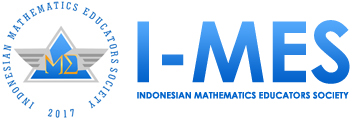Mathematical Elements and Concepts in the Quran
Abstract
Ethnomathematics encompasses mathematical practices within cultural groups, reflecting shared experiences, customs, and interests. This study focuses on the Muslim cultural group, characterized by adherence to the Quran as a guiding text, shaping their lifestyle and regulations. The research aims to elucidate mathematical elements and concepts present in the Quran, employing an exploratory methodology. Through the identification and evaluation of Quranic verses, the study reveals numerous mathematical concepts, including arithmetic operations, ratios, temporal measurements, spatial dimensions, and directional bearings. These mathematical elements manifest in diverse contexts within the Quran, such as the computation of rewards, distribution of inheritance, determination of the qibla direction, calendrical calculations based on solar and lunar cycles, and the temporal perspective concerning worldly life versus the hereafter. The findings offer valuable insights for educational purposes, suggesting the Quran as a rich resource for enhancing students' mathematical understanding. Integrating Islamic teachings and values into education can be effectively achieved through contextual and discovery-oriented approaches, utilizing the Quran as a foundational text.
Keywords
Full Text:
PDFReferences
Awan, N. M. (2009). Quran and Mathematics-I. Jihat al-Islam, 3(01), 39-59.
Britannica Encyclopedia (2020). Qiblah | Definition & Facts. https://www.britannica.com/topic/qiblah
California. State Board of Education. (1992). Mathematics framework for California public schools: Kindergarten through grade twelve. Hippocrene Books.
D'Ambrosio, U. (1985). Ethnomathematics and its place in the history and pedagogy of mathematics. For the Learning of Mathematics, 5(1), 44-48.
EduwebTV (2015). Matematik Tingkatan 5 – Bearing. http://eduwebtv.moe.edu.my
HistoryPod (2017). 16th July 622: The Start of Islamic Calendar. https://www.bing.com/videos/search?q=islamic+calendar&&view=detail&mid=CA7532BE197F445C9D60CA7532BE197F445C9D60&&FORM=VRDGAR&ru
Jamali, S. H. (n.d.). Geometric calculation of Qibla direction. https://ftp.unpad.ac.id/orari/library/library-islam/knowledge/qibla_calc.html
JustinTOOLs.com. Convert Lunar Years to Gregorian Years (lunar yrs to GY). https://www.justintools.com/unit-conversion/time.php?k1=lunar-years&k2=gregorian-years
Maidinsah, H., Zubairi, M. N. M., & Zahari, M. (2021) Mathematical Elements in Malay Traditional Game: A Case Study on Gasing Pangkah. International Journal of Arts and Commerce, 10(8), 5-15.
Mufti (2017). Taqwim Islam versus Taqwim Kafir? Tamadun Islam. Edisi Oktober 16, 2017. http://mufti.perak.gov.my/images/minda_mufti/2017/oktober/taqwim_syamsiah_qamariyah.pdf
National Council of Teachers of Mathematics (NCTM) (n.d.) https://www.nctm.org/Standards-and-Positions/Principles-and-Standards/Principles,-Standards,-and Expectations/
Ng, S. H., Neo, G. K., & Goh, J. H. (2020). Matematik Tingkatan 5. Pelangi Publication Sdn Bhd. Johor Bahru: Johor, Malaysia.
Reid, A., Petocz, P., Smith, G. H., Wood, L. N., & Dortins, E. (2003). Mathematics students' conceptions of mathematics. New Zealand journal of mathematics, 32(Suppl.), 163-172.
Sheikh Husin Jamali (n.d.). Geometric calculation of Qibla direction. https://ftp.unpad.ac.id/orari/library/library-islam/knowledge/qibla_calc.html
Shihabuddin A. (2011). Sirah: Perang Badar Al-Kubra. https://www.ustazusa.com/2011/01/sirah-perang-badar-al-kubra.html
Afiqah, M. T. S. (2019). A study of mathematical thinking in mengkuang weaving. Unpublished Master Thesis. University of Technology MARA Kelantan, Malaysia.
Wan Bakar, W. N. (2011). Mathematics in the Holy Quran. Journal of Academic Minds, 5(1), 53-64.
Yusof A. (2018). Penentuan Arah Kiblat Menggunakan Kaedah Trigonometri. https://www.thepatriots.asia/penentuan-arah-kiblat-menggunakan-kaedah-trigonometri/
Refbacks
- There are currently no refbacks.

This work is licensed under a Creative Commons Attribution-NonCommercial-ShareAlike 4.0 International License.
Indonesian Journal of Ethnomathematics
Indonesian Mathematics Educators Society
Jl. Terusan Jend. Sudirman, Kec. Cimahi Tengah, Kota Cimahi, Jawa Barat 40521
E-mail: [email protected]
ISSN: 2775-8001


